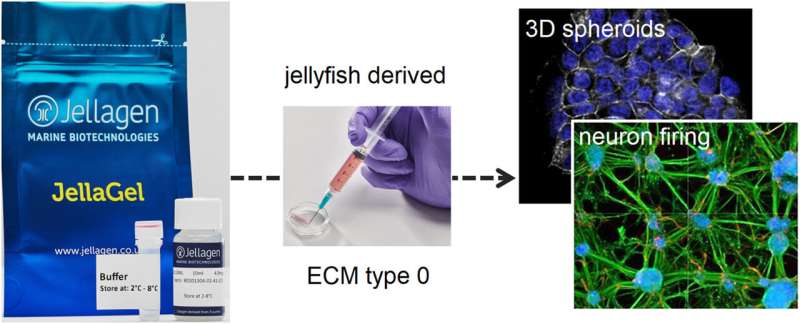This article has been reviewed according to Science X's editorial process and policies. Editors have highlighted the following attributes while ensuring the content's credibility:
fact-checked
trusted source
proofread
New research unlocks medical potential of jellyfish biomaterial

New research by the National Physical Laboratory (NPL) and UK biotechnology company Jellagen Ltd has revealed the potential of jellyfish collagen as the foundation for a range of new medical applications and to support new biological research.
Jellagen partnered with NPL to assist its development of the jellyfish collagen into a high value, high spec biomaterial product for use in health care. The research findings, published in the journal Materials Today Bio, include in-depth evidence of the attributes of the jellyfish collagen-based biomaterial to underpin a versatile range of products.
The biomaterial is shown to support the development of a range of human cells including stem, cancer and primary cells: and also specialist biological functions such as firing synchronicity of neurons, stem cell differentiation and cancer spheroid formation.
The collaboration, which was initiated through the UK innovation agency Innovate UKs Analysis for Innovators Program, has provided a clearer pathway for ongoing product development and research by helping to explain the mechanistic behavior of the collagen and also identify the optimal conditions to effectively manufacture products based upon it.
Most cells in human bodies need physical support to reproduce, communicate and form tissue and organs. Networks of proteins called extracellular matrices (or ECMs) provide this support by serving as scaffolds to house cells and enable the development of model tissue that more effectively mimics those in the body.
The importance of these matrices in tissue development has driven the search for a similar material to provide this scaffold feature for use in a range of medical applications—from hydrogels that promote tissue regeneration and organoids that mimic tumors to 3D cell factories for engineering biology.
In response to this search, UK biotechnology company Jellagen Ltd developed a revolutionary biomaterial based on a jellyfish collagen ECM matrix that is more than half a billion years old and which has been consistently reproduced in other life forms over millions of years.
The jellyfish matrix resembles multiple matrix types found in a diverse range of animals, from dinosaurs to humans. It predates all other matrix types but does not itself belong to one particular type. It has therefore been named as an extracellular matrix [ECM] type 0 ("zero")—that is, the original and first precursor to every other matrix that has come after it.
The research findings describe an extensive body of evidence for the performance attributes of the biomaterial to underpin a versatile pipeline of commercialized products under the collective name of JellaGel.
Andrew Mearns Spragg, managing director and CSO of Jellagen, said, "Our collaboration with NPL has enabled Jellagen to access cutting edge expertise in the analysis and characterization of our collagen biomaterials. The collaboration has given us invaluable access to important resources to support our research ambitions and provide critical insights in scientifically establishing the concept of ECM Type 0 (Zero) as the pre-cursor of all matrices."
"We highly recommend NPL to other biotech companies who are seeking to develop fundamental understanding of how their materials behave at the biological interface, and look forward to building on this partnership in the future."
Max Ryadnov, NPL Fellow in biometrology, says, "This has been an exciting collaboration in which we have learned a great deal and from the biomaterial as well. The interest in extracellular matrices in industry and medicine is significant and growing. Despite that, and the fact that there are many matrices under development, very few reach the stage of a finished product, let alone a product manufactured at scale."
"We are very pleased to have played an important role in the development of this pioneering and versatile product."
More information: Nilofar Faruqui et al, Extracellular matrix type 0: From ancient collagen lineage to a versatile product pipeline—JellaGel, Materials Today Bio (2023). DOI: 10.1016/j.mtbio.2023.100786
Provided by National Physical Laboratory





















